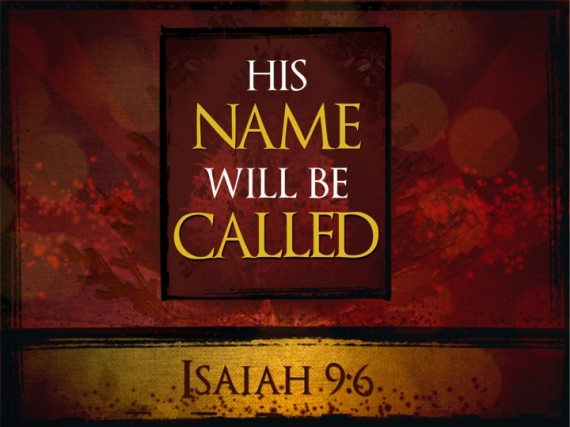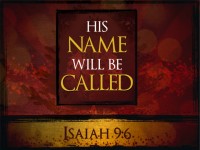
We looked briefly at Isaiah 9:6 yesterday, and the government of Jesus. In that same Scripture, Isaiah 9:6 also says that “his name will be called…” and then goes on to list a bunch of names: Wonderful Counselor, Mighty God, Everlasting Father, Prince of Peace.
Most often we tend to think that Isaiah 9:6 contains several names for Jesus. But I don’t think this is the best way to understand this Scripture.
No Names for Jesus in Isaiah 9:6
First of all, Isaiah says that this child will have one name (singular). But if this is so, why would Isaiah then go on to list four names in Isaiah 9:6? (Or five names, depending on how you count.)
Second, if these are names of Jesus, then we run into some serious problems understanding the text. For example, nobody in Isaiah’s day though that the Messiah was going to be God Himself. And so Isaiah would not have written that the Messiah was “Mighty God” if he meant by this that the Messiah would be “God incarnate.” Even more seriously, the third “name” is “Everlasting Father.” Unless you don’t believe in the Trinity, you are probably not ready to say that Jesus is God the Father.
So in light of these sorts of difficulties, it seems better to understand the “names” of Isaiah 9:6 not as “names” but as descriptions of the one name, Jesus. In this way, Isaiah 9:6 is saying, “And He will be described in this way…”
What then do the four descriptions in Isaiah 9:6 mean? Here is brief summary of each:
His Name will be Called Wonderful Counselor
This does not indicate that the Messiah is like a good and loving psychologist. They did not have counselors like this in the days of Isaiah. Instead, counselors were those who were expert military and political strategists. The surrounding context indicates that He will be such a good strategist, that there will be no end to His Kingdom (9:7).
His Name will be Called Mighty God
Jesus was certainly God, but it is unlikely that Isaiah or his contemporaries understood that the Messiah would be God in the flesh. Instead, this was originally a reference to someone who acted as God’s representative on the field of battle. In Ancient Near Eastern thinking, this title would be given to someone who was God’s champion on the field. It was believed that God actually fought the enemy in and through divinely-empowered warrior kings.
His Name will be Called Everlasting Father
Again, this is not a reference to the Trinity, and even if it was, we would have problems with this title, because Jesus, the second person of the Trinity, is not God the Father, the first person of the Trinity. Instead, “Father” should be understood in the sense of “protector, provider, or benefactor.” The Messiah would be the protector and provider over all people for eternity.
His Name will be Called Prince of Peace
Finally, the ultimate result of the Messiah rule and reign will be Peace. there will be peace and prosperity on earth for all people throughout all time.
This is the might, power, humility, wisdom, and peace that was wrapped up in a tiny little bundle and laid in a manger of hay so many years ago. It was not what we expected, nor what we looked for, but it is what God provided, and it is through Jesus that peace on earth will come.
Note: This is an excerpt from: Scripture on Christmas – Isaiah 9:6.




Great explanation Jeremy.
Good post, Jeremy. Check out this one. I wonder if the points are complementary. God bless, Dale
http://www.patheos.com/blogs/kermitzarleyblog/2013/12/is-jesus-mighty-god-or-mighty-warrior-in-isaiah-9-6/
Thanks, Dale. I am headed over to read it now.
A few years back (2008) John Walton had an article posted at Koinonia about these verses ( http://zondervan.typepad.com/koinonia/2008/12/hebrew-corner-13-what-is-in-a-name-isa-96-by-john-h-walton.html ). He presents the idea of this being one long name which is theophoric in nature. I found it helpful because it makes sense and it somewhat sidesteps this issue of calling the Messiah God.
Yes, I think I read that article. One long name is definitely an option!
FYI: “Everlasting Father” can be legitimately translated as “Father of Eternity,” which seems to me to be a better translation and lessens the problem of explaining it with respect to the Trinity; it depicts the Messiah as the author of eternal life.